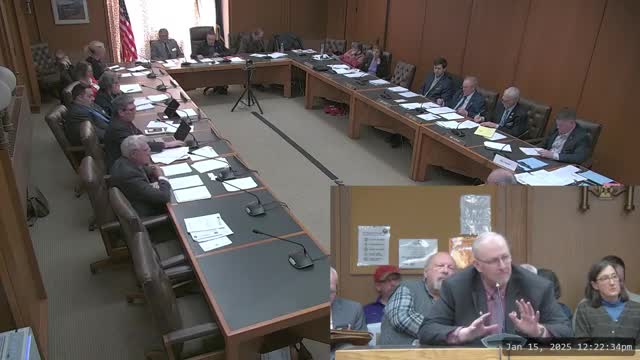Panel Hears HB 203 to Require Coast Guard‑Approved PFDs for Canoes, Kayaks and Rowing Craft in Cold‑Water Season
Get AI-powered insights, summaries, and transcripts
Subscribe
Summary
HB 203 would require people in canoes, kayaks and rowing shells to wear U.S. Coast Guard‑approved personal flotation devices between Nov. 15 and May 15 to reduce cold‑water immersion and hypothermia deaths.
The committee considered HB 203, a bill that would require occupants of canoes, kayaks and rowing shells to wear U.S. Coast Guard‑approved personal flotation devices (PFDs) between Nov. 15 and May 15.
Representative John T. McDonald, the prime sponsor, told the committee the measure addresses the increased risk of cold‑water immersion and hypothermia in late fall and early spring. “Wearing a personal flotation device will not totally prevent hypothermia, but it will certainly prevent the quickest onset of it and save your life,” he said, adding that many paddlers do not appreciate how quickly water at low temperatures can incapacitate limbs needed for self‑rescue.
Captain Tim Dunleavy of the Marine Patrol testified in support. Dunleavy cited national and state data showing that a large majority of boating‑related drowning victims were not wearing life jackets; he emphasized the rapid loss of motor function in cold water and described modern inflatable PFD options designed to be comfortable and minimally intrusive for paddlers. “It is the rapid onset of cold‑water incapacitation that often prevents self‑rescue,” Dunleavy said, urging the committee to adopt the measure as a targeted seasonal safety step.
Opposition testimony included a witness who said the proposal ran counter to a “live‑free‑or‑die” tradition and would substitute government mandates for personal responsibility; that speaker urged education rather than a mandatory seasonal wear rule.
Current law and scope: Under existing state law, recreational boats must carry a Coast Guard‑approved PFD for each person on board and children 12 and under must wear life jackets; HB 203 would require active wear (not just carriage) for the small paddle and rowing craft listed during the defined cold‑water season. The sponsor cited similar rules in other states, including Massachusetts, Maine, Rhode Island and Pennsylvania.
Outcome at hearing: The committee recorded a blue‑sheet count of 1 in favor at the close of testimony. Marine Patrol offered to provide additional boating‑safety materials and statistics to the committee on drowning incidents, and requested the committee consider public‑education efforts to accompany any legal requirement.
What’s next: The Marine Patrol agreed to provide the committee with drowning statistics and additional details on modern inflatable PFDs; sponsors said they would coordinate on public outreach if the bill advances.
